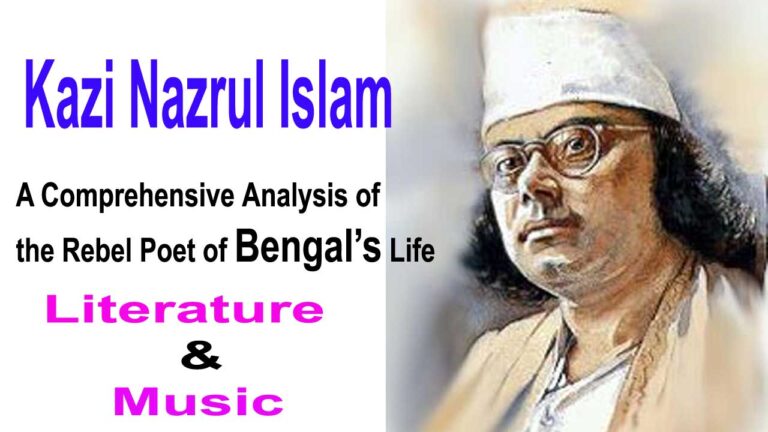Discover the life story of Kazi Nazrul Islam, his struggles in childhood, literary creations, and the new wave of his music. This article provides a detailed analysis of Nazrul’s birth, childhood, literary, and musical life. Additionally, learn about his mental illness and his legacy for the present generation. Read this article to honor Kazi Nazrul Islam and appreciate the depth of his literature and music.
Early Life and Childhood of Kazi Nazrul Islam
Birth and Family Background
Kazi Nazrul Islam was born on May 24, 1899, in Churulia village, West Bengal, India. His father, Kazi Fakir Ahmed, was an imam of a mosque and a custodian of a shrine. His mother, Jahida Khatun, was a devout woman. Nazrul was the second child in the family. His family was deeply religious, which significantly influenced his future life.
Childhood Poverty and Struggles
Nazrul’s childhood was marked by extreme poverty. After the death of his father at a young age, the family’s financial condition worsened. Despite this, Nazrul was exceptionally talented and showed a keen interest in literature from a young age. He received his primary education at a local madrasah and worked as a muezzin in the mosque, contributing to his family’s income.
Education and Musical Inclinations
Primary Education and Madrasah Life
Nazrul began his primary education at a local madrasah, where he studied Arabic, Persian, and Islamic teachings. From an early age, he demonstrated exceptional intelligence and rapidly entered the world of learning. After completing his madrasah education, he enrolled in Raniganj’s Searsole Raj School, but his academic journey was interrupted due to financial difficulties.
Joining the Leto Group and Musical Life
Alongside his education, Nazrul joined a local Leto group, where he honed his skills in writing and performing songs. This marked the beginning of his literary and musical career. During his time with the Leto group, he composed several popular songs and poems that later became a significant part of Bengali literature and culture.
British Army Service and Literary Beginnings
Military Service and War Experiences
In 1917, during World War I, Nazrul joined the British Army. He served in various locations, including Mesopotamia (present-day Iraq) and Karachi (present-day Pakistan). His experiences in the war had a profound impact on his literary career and shaped him into a rebel poet.
Beginning of Literary Career
During his military service, Nazrul started writing various essays, poems, and songs. His first poetry book, “Agnibina”, was published in 1922, instantly propelling him to fame. The poem “Bidrohi” (The Rebel) established him as the ‘Rebel Poet’.
Nazrul’s Literary Works: Rebel and Egalitarian Poetry
Rebel Poetry: Expression of a Defiant Soul
The poem “Bidrohi” is one of Nazrul’s most famous works, where he speaks of human liberation, freedom, and social equality. In this poem, he identifies himself as the “eternal rebel”. The poem reflects his remarkable courage and love for humanity, establishing him as one of Bengal’s prominent figures.
Egalitarianism and Humanity
In his writings, Nazrul advocated for egalitarianism and humanity. His poems and essays criticized religious extremism and social inequality. His articles and poems published in “Dhumketu” and “Dolon Chapa” journals directly challenged British rule and inspired people to fight for freedom.
Nazrul Sangeet: A New Wave in Bengali Music
Nazrul Geeti: Songs of Love, Nature, and Humanity
Nazrul introduced a new wave in the music world, known as “Nazrul Geeti”. His songs cover themes of love, nature, and humanity. His music blends Islamic, Hindu, and Western melodies, giving him a unique place in the music world.
Love for Music and Contributions
Nazrul maintained his love for music throughout his life. He composed more than 4,000 songs, which remain a cherished part of Bengali culture. His songs continue to resonate with people and are integral to Bengali life and culture.
Personal Life and Mental Illness
Marriage to Pramila Devi
In 1924, Nazrul married Pramila Devi, who was a significant part of his life. They had four children, but only two survived for a long time.
Mental Illness and Impact on Literary Work
In the later part of his life, Nazrul suffered from mental illness, which interrupted his literary career. In 1942, he was afflicted with paralysis and lost his ability to speak. This marked the end of his literary activities.
Death and Legacy of Kazi Nazrul Islam
Death and Recognition as the National Poet of Bangladesh
Kazi Nazrul Islam passed away on August 29, 1976, in Dhaka. Bangladesh honored him as their national poet, and his legacy remains intact. His literature, music, and thoughts continue to be a valuable part of Bengali culture.
Nazrul’s Legacy and Influence on the Present Generation
Nazrul’s literary works and thoughts have left a deep impact not only in his time but also on the present generation. The courage, love, and humanity reflected in his writings continue to inspire us today.

Your comment will appear immediately after submission.